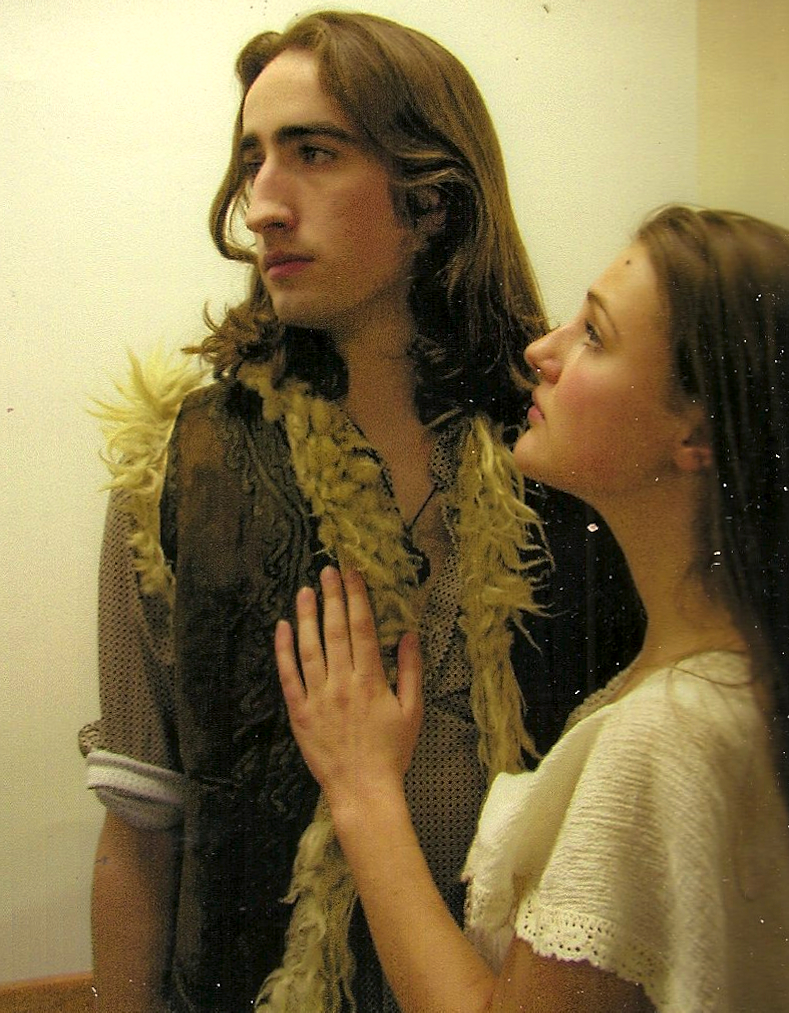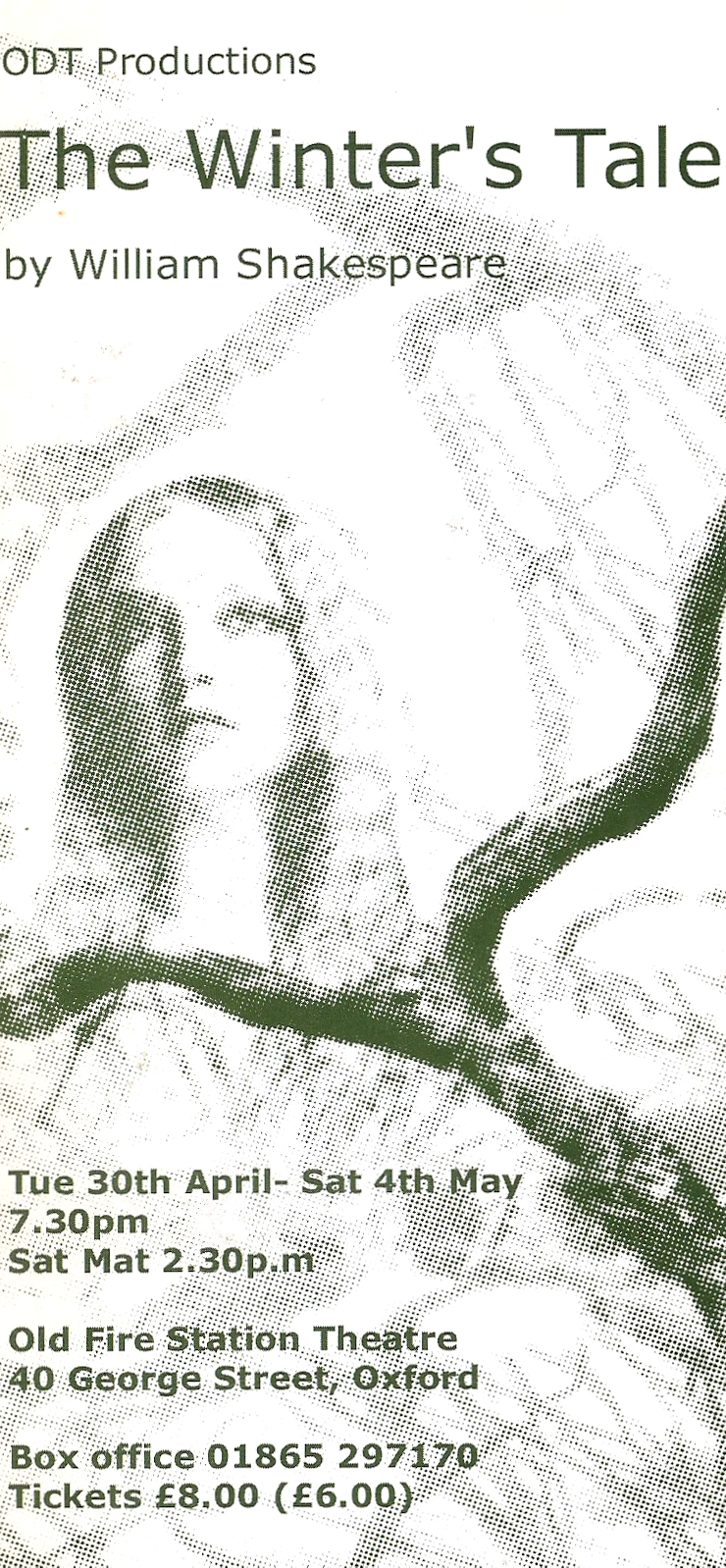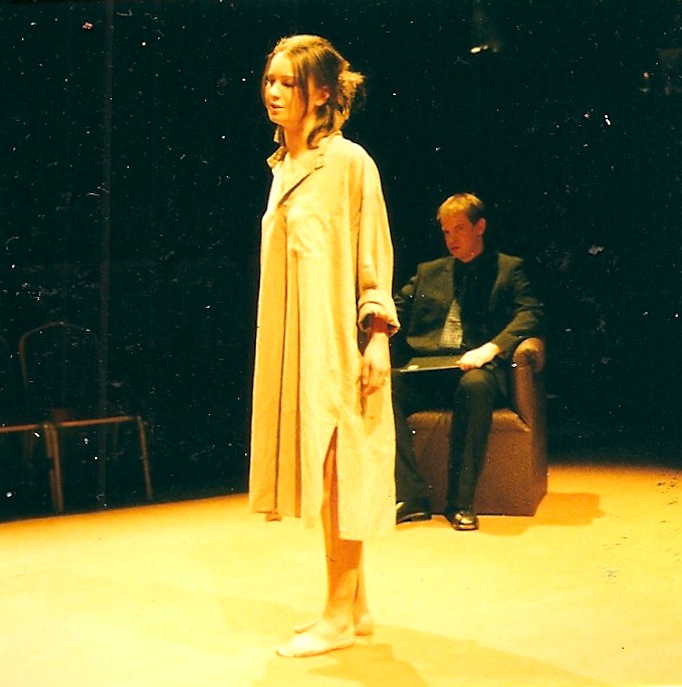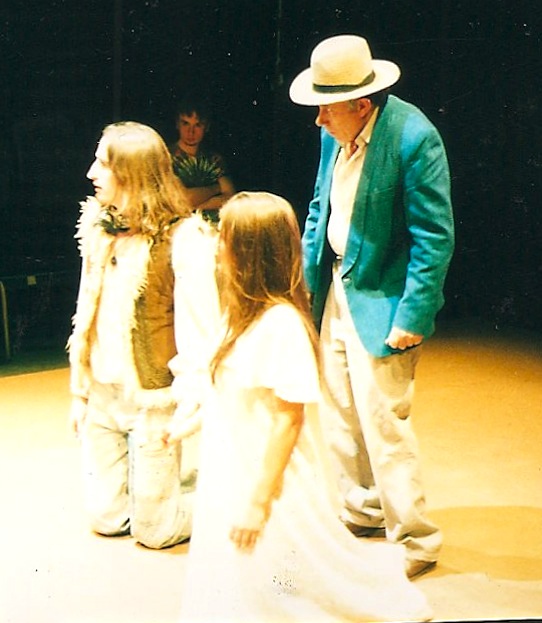
Again please see the programme notes which have more information about my ideas for the production.
After A Midsummer Night’s Dream I had decided to forego Shakespeare, at least for a bit, and Caryl Churchill’s play Cloud 9 was a possibility for the next ODT production. However, I found myself profoundly moved by Alex Jennings’s performance as Leontes at the National and by The Winter’s Tale as a whole. I knew I had to give myself the opportunity of becoming really absorbed with this magnificent text.
Still working at the Old Fire Station, I resolved again to set the play in traverse, as it is even more obviously about a journey, featuring Court and Countryside, the characters travelling between both. This setting received a favourable comment from audience member, Don Fathers, who thought the play ‘all the more affecting by drawing the audience closer to the players. The traverse playing space, uncluttered by any set, meant that not a shred of the agonising text was lost to the listener.’
I decided again to update the play, as Shakespeare is dealing with the universal themes of relationship, youth and age, suffering and reconciliation. The first half was set in the 1980s, ‘a decade of strident individualism’, while the ‘pastoral’ scene, sixteen years later, took place at a Stone Henge Festival, in ‘truly celebratory style.’ Daily Information critic, Jeremy Dennis, described it as ‘a vibrant, tie-dyed folk festival of free love, noisy songs and funky dance numbers … The play reaffirms its essentially timeless quality in the final scene, when we are required to “awake out faith” and witness the magic of Hermione’s statue coming to life.’

I was sure that Alex Nicholls, who had played the relatively small part of Quince in A Midsummer Night’s Dream, would be a strong Leontes, his powerful voice and impressive physical demeanour giving him the chance to act one of the Bard’s most demanding roles. To quote Alex, ‘Leontes is both thrilling and disturbing to play. There are powerful soliloquies, full of unhinged thoughts, taking you right “inside his head”, a snakepit of sexual anxiety and horror (wives are “sluiced” and “slippery”). Leontes has a morbid jealousy which rules him completely.’
I made the right decision. Alex in character was described by Jeremy Dennis, as ‘powerful and disturbing, sliding effortlessly from loving father and gracious monarch to jealous husband, betrayed friend and murderous tyrant.’
As said in the previous chapter, I had met Porscha Fermanis in the context of A Midsummer Night’s Dream auditions, in which sadly all the parts had been cast before her arrival. I thought now that she would play a very feminine, lively, young Perdita, Leontes’ daughter. However, at auditions, which Porscha and I supervised between us, another student, Alex Clarke, appeared. She was, if possible, equally beautiful, youthful and enchanting, a perfect Perdita. Although we had spoken about the play, I had not yet formally cast Porscha, so on the spur of the moment she tried speaking Hermione’s words, and with her greater vocal range, physical and gestural maturity, we decided that she should now play Hermione, and Alex, Perdita.

on trial, with Leontes (Alex Nichols) in the background
This turned out to be a good decision: Porscha as Hermione was described by audience member, Gerard Gould, as ‘wonderfully feminine and alive and made it even plainer than usual that Leontes was a fool.’ Perdita too was just right, as can be seen from the reviews and photos in the local press, where she is paired with a young male student, John Walton, who was her perfect match as Florizel – youthful, attractive, somewhat hippie. As Gerard Gould exclaimed, ‘What a find the two lovers are! I can’t remember ever seeing two such F and P (hurrah for Balliol and National Youth Theatre and hurrah for elitism!) and no wonder Oxford Times displays them on the front page. I hope they won’t let it go to their heads!’

Actors throughout – Camillo, Polixenes, Paulina, ‘dripping with morbid authority’, the ‘comic’ characters, Autolycus and followers, together with Rhys Morgan’s ‘lugubriously clownish young shepherd’ all received praise for their contribution to an ‘attractive rendering of this horrendously difficult play.’
Although I had criticism of myself for one or two minor aspects of production, I was on the whole gratified that I had had the guts to tackle this most demanding of Shakespeare’s plays. As Gerard said, ‘All in all, a memorable evening and you so obviously inspired a young cast to commit themselves to such a difficult but rewarding text.’ Comments like that made all the angst seem worthwhile!

‘The Winter’s Tale is a tough play, and one that keeps on surprising to the very end. Very rewarding for actors and audiences alike.’
- Jeremy Dennis, Daily Information
‘I came to see The Winter’s Tale and loved it. Actually all my family did, even Madeleine who is nine and understood about two words in ten, but she said she understood the story because you all “showed her what was happening”. I have never seen the play so it was new and exciting territory for me.’
-Audience member
To quote Baz Luhrman,
'Shakespeare says vital things to the present. His plays have got to be adapted in order to evolve – that’s how he stays alive. The best Shakespeare is always Shakespeare made contemporary.’
Do you agree?